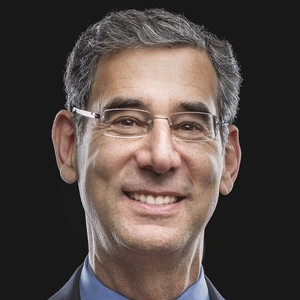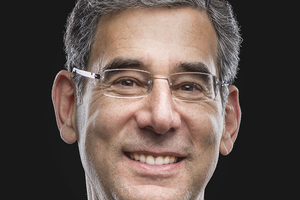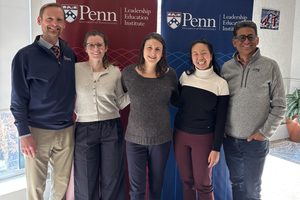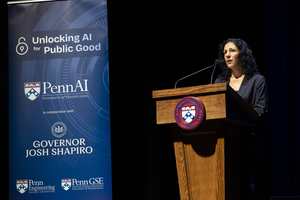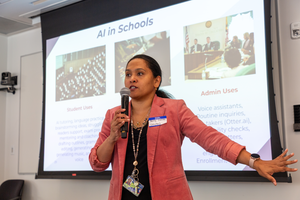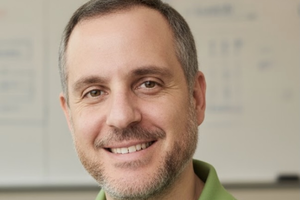Faculty Expert
-
L. Michael Golden
Vice Dean of Innovative Programs and Partnerships, Catalyst @ Penn GSE
Policy, Organizations, Leadership, and Systems Division
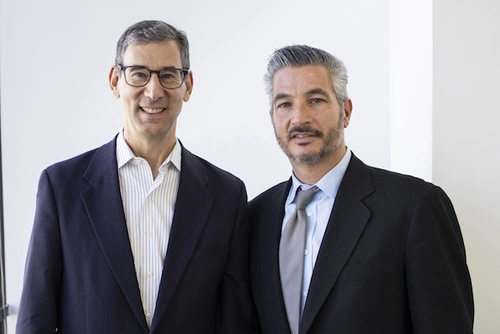
When Catalyst @ Penn GSE and StartEd partnered last winter, they envisioned making EDTECH WEEK 2020 festival drawing innovators, entrepreneurs, and investors to New York City in June.
As the seriousness of the Covid-19 pandemic became apparent, the teams pivoted. Their in-person event was transformed into four days of remote learning and networking events for the education and workforce learning community.
While educational technology was still a main theme, the organizers added panels and masterclasses that directly addressed the challenges the pandemic posed to educators, students, and families.
When Black Lives Matters protests started happening across the country after George Floyd’s killing, sessions that had been designed to address equity gaps in education offered frank conversations about where schools and colleges have failed to address systemic racism and what more needs to be done.
Ultimately, more than 4,000 educators, entrepreneurs, funders, investors, and researchers signed on to connect with experts and each other.
We talked with Catalyst @ Penn GSE Executive Director Michael Golden and John Gamba, Entrepreneur-in-Residence and Director of Innovative Programs at Catalyst, about what education might look like in the fall, the value in remote networking, and why conferences might look different in the future.
When the conference moved online, why did you choose to directly address how COVID-19 is affecting education?
Golden: At Penn GSE, we collaborate with people working at every level of education, and we saw a dramatic dislocation between the past and the future. Everyone we talked to — teachers, superintendents, policy leaders, ed entrepreneurs, investors, college administrators — needed a game plan to help them get through it. We thought, Let’s create an event where they can get the best advice to build that gameplan.
Gamba: The story of this year's EDTECH centers around adaptation. We were thinking about COVID and all the essential questions that come with it: When will school restart? How will parents be involved as we pivot to a new normal? What will happen to the mental health of the students who get through COVID and then have to go back to school in one way or another in the fall? Then this second big event happens, which is racial injustice and turmoil with the death of George Floyd, and we had another adaptation to consider. Do we cancel the event? Is this just too much for us to move forward? And once again, through that adaptation and a lot of careful thought about those who are going to be presenting, we decided to proceed, but lean on the insight of our experts.
How did the overall goals of the conference shift as you pivoted from a conference about educational technology and innovation more broadly, to specifically looking at COVID-19 and its impact on educational access and opportunity?
Gamba: We thought we would ask the necessary, essential questions, and through those questions bring in the right thought leaders who could answer them. We had a platform where we could bring in leading experts who could talk about key issues like parental engagement, mental health literacy, racial equity. But we could also have small, focused sessions where researchers and working educators could work on case studies regarding topics like improvement science, and explore ideas like higher education innovation and learning advances in K12 education.
Golden: Many people’s first thought of an online conference is something cold or impersonal. I'm really proud that we created a safe environment of trust in all of these sessions, where people felt they could be raw and candid and honest. It was really powerful when people are telling very personal stories of their expectations and their frustrations and their disappointment in where we are in the education system, which I think many of us have felt for a long time. Providing diverse voices the chance to offer advice on how to take action to change the equation was energizing.
How did you preserve networking even though the event was held online?
Golden: Networking opportunities are often treated like a bonus at conferences. We knew in this time of crisis that one of the most important things we could do was to connect people, so we tried to accentuate that in every design choice we made.
We created opportunities for connection, collaboration and networking in each session, whether through chat or Q and A, polling, small breakout groups, interactive think tanks and more.
Gamba: In the evening sessions focused on entrepreneurship, everybody had scheduled five-minute one-on-one networking sessions either randomly or you were matched by an app with somebody who shared your interests, basically speed dating for networking. And the way that they were set up was the venture would interact with the investor, or the venture would interact with the education expert. We had anecdotes of people who had 16 meetings in a 90 minute session and are now following up on those sessions with actual presentations to EDTECH investors.
One of the big questions for many families and educators is what both K-12 and higher education are going to look like in the fall. What were some of the takeaways that you have about how schools and higher education institutions can safely operate and support students this fall?
Golden: First of all, there's no one size fits all. The underlying message that's come out loud and clear is that the inequities in our system are even more pronounced through the pandemic than ever before. And if you're a district superintendent or a university president, you already know this, but now it's been made visible to the world.
The second is that we do know a lot about how people learn. In almost every conversation, there was a recognition that blended learning that includes in-person and online will be part of the future. There'll be no snow days ever again.
Third, this is going to be a really complex and problematic situation for school leaders to work through given all of the potential pathways of the virus. Flexibility and adaptability will be key to all this. This is a generational challenge for the leaders who will have to take this on with fixed budgets, limited facilities, and outside political pressures.
Now there has been a disruption to the system, it would be a horror if we go back to where we were. But we also know we're not great at what's required. And the number one place we're not very great is with the teaching, with educator proficiency. So, there's a pedagogical, an instructional, and a support requirement for teaching that has to be prioritized. Every school and university leader should be focusing on addressing that need now.
Are there things you’ve learned about conference design that you would like to incorporate into in-person events in the future?
Golden: We chose to focus on the capabilities and affordances of the online tools we could use rather than what we lost by not being in person. That led us to invent ten new modalities that leveraged the technology and allowed us to do things we could never have done if we were sitting in conference rooms.
We based everything on what we know about people learn. How do you leverage the interests and identities people bring into the room? How do you make sure sessions stay learner-centered, even when your presenters are luminaires in their field? One of the keys can be interacting to solve real problems, so each session posed a real problem that we were working to solve. Fitting a conference into a stay-at-home context with multitasking the norm is more complex than in-person events where people have set their entire attention and schedule focused on the event. We hope to parlay all we learned into the future, both when we can finally get together in person and as we continue to convene online.
Gamba: I’ll just add that the setup broke down the barriers between the experts who were presenting and the attendees, many of whom are expert teachers in their field, even if they aren’t famous. My favorite example was at the end of Paul Quinn College President Michael Sorrell presentation. His five year-old-daughter walked in, got on his lap and asked, ‘Daddy, can I have your password?’ That was one of the greatest moments of the entire conference that somebody as incredible as Michael Sorrell really has a five-year-old who came in to talk about Disney Plus. How much better can it be? And I think that through the authenticity, there was even more enlightenment as to what needs to happen [at a convening] instead of just prepared speeches or a canned PowerPoint.
